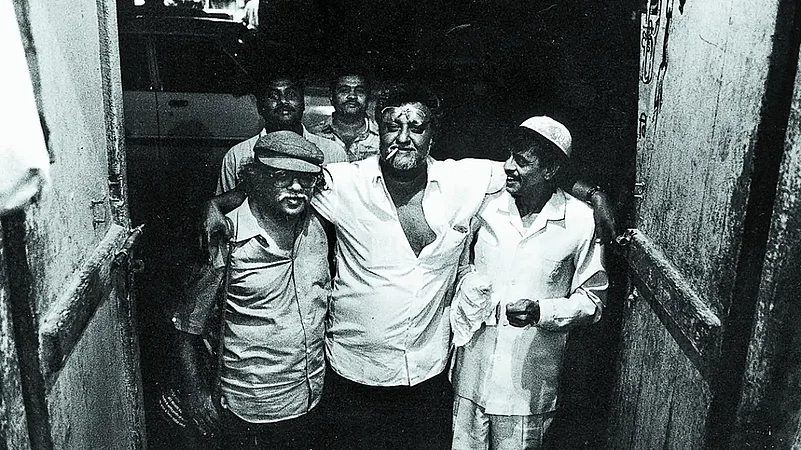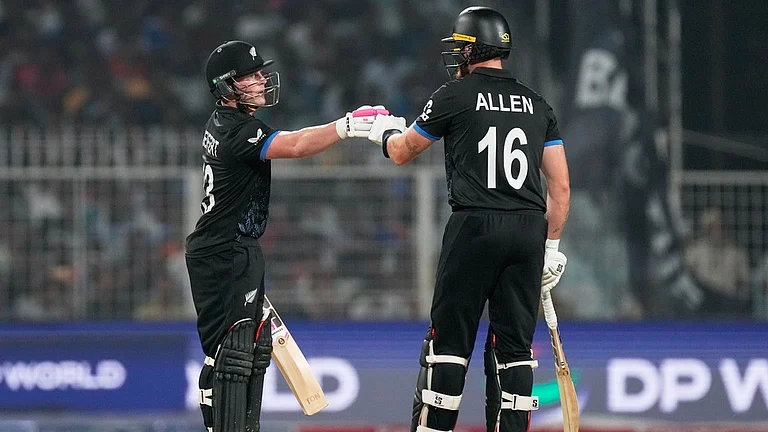There’s a current of blood flowing through all pronouns now.
My day is rising beyond the wall of grammar.
God’s shit falls on the bed of creation.
Words, pistol shots. Like the headline of Outlook’s very short review said in 2007 . Namdeo Dhasal’s Marathi in Dilip Chitre’s English. Navayana, a fledgling independent publishing house, in its fourth year, gave the world Namdeo Dhasal: Poet of the Underworld, Poems 1972–2006. One of the finest poets of our time, Chitre, was as much at ease with Marathi as he was with English. For over four decades he had been translating Dhasal: among the greatest Indian poets of the twentieth century. Chitre grappled with a shapeshifting variant of Marathi that was admittedly far removed from the bourgeois world he and his friends came from. Thousands of savarnas and hundred-thousands of Dalits in the Marathi-speaking world had become fans of Dhasal well before the momentous year, 1972, when Golpitha (gol, a round structure; pitha, a country liquor shop), was published. The poetry was set in Kamathipura, the red-light district of Mumbai . The same year, Dalit Panther was founded, with Dhasal as one of its architects.
Taxi Driver. Ruffian. Force of Nature. God of Poetry. The Great Other. Mahar. That’s how Chitre saw Dhasal. Chitre was born a Chandraseniya Kayastha Prabhu (the same caste as Balasaheb Thackeray), steeped in the ethos of classical Marathi and ‘Sanskritic’ poetry, art and music. He was also one of the boys in Clearing House, where friends published each other’s works, and unwittingly ran the CIA-funded literary journal, Quest. Parallel to his own poetry and work on Dhasal, Chitre was translating the works of Jnaneswar (twelfth century) and Tukaram (sixteenth century). The same poets, I later discovered, Babasaheb Ambedkar keenly read.

In 2004 or 2005, Tehelka, then a broadsheet, featured Chitre’s translations of Dhasal. The translations were dazzling. I lived in Chennai, worked for Outlook as a correspondent by day, and Navayana was my moonlit passion. I got in touch with Chitre, and through him with Dhasal, and signed an agreement. Since Chitre asked, explaining his and Dhasal’s indigence as poets, I paid pitiful advances of five thousand rupees each to the poet and translator. Once the book was published, I paid another five thousand rupees. Two years passed. There was no manuscript. Chitre then told me over the phone that the book would get done only if I paid them a visit. I set off to Pune in January 2007, where Chitre and the love of his life, Viju, lived in a small flat.
It felt like both a pilgrimage and a homecoming. Chitre and Viju slept on a bed fitted into the balcony. I was given the sole bedroom, where their son, filmmaker Ashay Chitre, had died, choking, alone, as the room caught fire, perhaps from his cigarette. That was 2003. He was 30. His death was called a mystery. Kumar Gandharva and Bhimsen Joshi coloured our evenings over gin laced with a thin peel of jamun soaked overnight. I was served vodka with a dash of star anise. We watched some of Chitre’s prize-winning films. We talked into the night. I ate some of the best food of my life. I was briefly their Ashay. Chitre was bad with computers and did not know one final draft from another more final draft. Viju helped me sort things out. His first and finest reader, she had helped him improve the translations and finalise them. In three days, the manuscript was ready. I had little to do as editor.

Just when I was planning a grand release for the Dhasal–Chitre book, the British Council, in association with the London Book Fair, announced a contest for International Young Publisher of the Year—something the former coloniser did as reparation to help publishers from the developing world find their way in the international “market”. In April 2007, at the IYPY contest, each of us was to do a “book pitch”. Mine was the handsome, unconventional nine-square-inch hardback, Namdeo Dhasal: Poet of the Underworld. I had a reason for the large format: some of Dhasal’s lines were rangy and threatened to jump off the page, like in Ginsberg’s Howl. I did not want to inflict line breaks on the poetry. Inside, the edition featured covers of several Marathi works, including Dhasal’s own stunning design of Golpitha, along with the German Henning Stegmüller’s photographs.
Queering the pitch, one IYPY jury member told me, “Poetry contributes to under 3 per cent of the global book market. And translated poetry even less so. Why did you choose to present this book?” I let Dhasal do the talking: “Man, you should explode/ Yourself to bits to start with/ Jive to a savage drum beat/ Smoke hash, smoke ganja/ Chew opium, bite lalpari…” I told them Neruda did not write in English, but the whole world reads him now. I want the same for Dhasal.

I managed to price the 180-page hardback at just Rs 350 with a print-run of 1,400 copies. A dozen rave reviews appeared. I thought I’d run out of copies in a matter of months. It took me over four years to exhaust the stock. I felt like Guru Dutt in Kaagaz ke Phool. I often feel that way but find strength in Tukaram’s abhang, Lahanpan dega deva/ mungi sakhrecha rava—Lord, give me smallness /A granule of sugar that the ant gets.
I keep Dhasal in print in a smaller format, with a new title, A Current of Blood—with no photographs and many forced line breaks. For this mighty river of a Broken Poet, the sales remain a trickle—it now takes three years to sell a thousand copies. This story of India’s best poet in translation did not deter me from taking on translations or poetry.
What I learnt on my trip to London was this: in the first world, the state and its art and poetry councils, despite the austerity of their conservative governments, subsidise independent presses. University presses overseas are heavily underwritten. India has no university presses. Only poor independents. Tilted Axis Press signed up Geetanjali Shree’s work well before Indian publishers entertained this 750-page novel. In fact, the Indian trade edition was published close to a year after it appeared in London, just ahead of the Booker brouhaha.
In 2012, I published Gogu Shyamala’s short stories with an intriguing title, Father May Be an Elephant and Mother Only a Small Basket, But.... Reviews and acclaim ensued. Shyamala was invited to Jaipur. Invitations to conferences in Australia and Germany happened. The sales were dismal though. Shyamala’s work had not found a publisher in the original Telugu. In fact, several Telugu readers read Shyamala for the first time in English. Why so? A note in the book spells out the reasons: “These stories are written in a variant of Telugu used by Dalits in the Tandur region of western Telangana. Academic and official Telugu is sanskritised and has an upper caste, Andhra slant.” At the same time as Tomb of Sand, Tilted Axis Press’s Deborah Smith—a translator who put her own Booker earnings to found the press—approached Navayana for the UK–US rights for Shyamala’s book. It has since notched a review in The Guardian.
In premodern times, the best poets of the subcontinent mostly sang their verse, and they sang and re-cited each other with joy. Poetry spread, literally, by word of mouth. From the Sangam poets (translated by A.K. Ramanujan and George Hart in the 1970s and 1980s), to what is reductively called the Bhakti movement, poetry gave wings to every language—as vachana, abhang, shabad, bani, sakhis, ghazal, bandha, padams. Many of these poets had working-caste and working-class backgrounds—what we now call Dalit-Bahujan. Yet, in the global Anglophone market, only the novel and big nonfiction travel. Our best poetry languishes. Let us return to poetry. Let a current of blood flow through all pronouns now.
(Views expressed are personal)
S. Anand is the publisher, Navayana





















